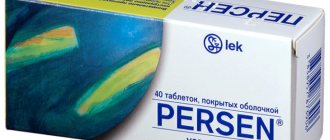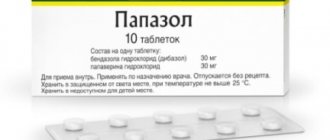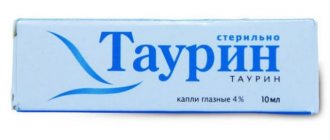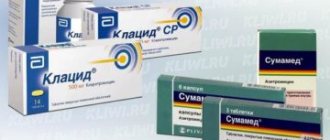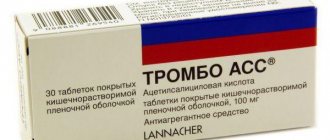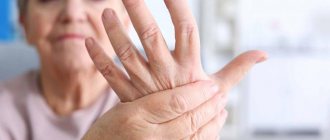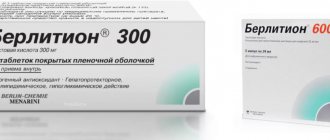Release form and composition
Novigan is produced in the form of film-coated tablets - round, biconvex, white, with "NOVIGAN" embossed on one side, white or almost white on the cut (10 pieces in blisters, 1 or 2 blisters in a cardboard pack).
Composition of 1 tablet:
- Active ingredients: ibuprofen – 400 mg; fenpiverinium bromide – 0.1 mg; pitofenone hydrochloride – 5 mg;
- Auxiliary components: corn starch, talc, microcrystalline cellulose, glycerol, magnesium stearate, colloidal silicon dioxide;
- Film coating: macrogol 6000, titanium dioxide, sorbic acid, hypromellose 6 cps, polysorbate 80, talc, dimethicone.
Do pills help with toothache and headaches?
All drugs based on the substance ibuprofen are widely used to eliminate pain of various etiologies. Thus, the complex composition of Novigan gives even more pronounced results for headaches and toothaches, since it has an anti-inflammatory effect supported by other components and relieves spasms.
Considering that dental discomfort is usually very painful and intense, a single-component product may not provide the desired relief, but the combination of three active substances in the drug in question is guaranteed to alleviate the patient’s condition. Thus, the tablets help with both headaches and dental pain, and with a high rate of effectiveness.
Contraindications
Absolute:
- Exacerbation of inflammatory bowel diseases (including ulcerative colitis);
- Active bleeding from the gastrointestinal tract;
- Erosive and ulcerative lesions of the mucous membrane of the duodenum and stomach;
- Progressive kidney disease or kidney failure;
- Active liver disease or liver failure;
- Acute intermittent porphyria;
- Confirmed hyperkalemia;
- Hematopoietic disorders;
- Hemorrhagic diathesis, blood clotting disorders (hemophilia, hypocoagulation, etc.);
- Granulocytopenia;
- The period after coronary artery bypass surgery;
- History of urticaria, rhinitis and an attack of bronchial obstruction after taking acetylsalicylic acid or other non-steroidal anti-inflammatory drugs;
- Intestinal obstruction;
- Tachyarrhythmias;
- Prostatic hyperplasia;
- Diseases of the optic nerve;
- Angle-closure glaucoma;
- Glucose-6-phosphate dehydrogenase deficiency;
- Pregnancy and lactation period;
- Children and adolescents up to 16 years of age;
- Hypersensitivity to any of the components of the drug.
Relative (the drug is used with caution, the likelihood of complications is high):
- Cerebrovascular diseases;
- Cardiac ischemia;
- Congestive heart failure;
- Arterial hypertension;
- Peripheral arterial diseases;
- Blood diseases of unknown origin (anemia, leukopenia);
- Hyperbilirubinemia;
- Nephrotic syndrome;
- Diabetes;
- Creatinine clearance less than 30-60 ml/min;
- Hyperlipidemia/dyslipidemia;
- Enteritis, gastritis, colitis;
- Presence of Helicobacter pylori infection;
- Peptic ulcer of the duodenum and stomach (including a history);
- Severe somatic diseases;
- Alcoholism, smoking;
- Elderly age;
- Concomitant use of the following drugs: antiplatelet agents (clopidogrel, acetylsalicylic acid, etc.), selective serotonin reuptake inhibitors (fluoxetine, sertraline, paroxetine, citalopram, etc.), oral glucocorticosteroids (prednisolone, etc.), anticoagulants (warfarin, etc.) ;
- Long-term use of non-steroidal anti-inflammatory drugs.
Directions for use and dosage
Novigan tablets are taken orally one hour before meals or three hours after meals. To avoid stomach irritation, the drug can be taken immediately after meals or washed down with milk.
For spastic pain, the recommended dose is 1 tablet 3 times a day. The maximum dose is 3 tablets per day. It is prohibited to exceed the indicated dose.
The duration of treatment without consulting a doctor is no more than 5 days. A longer course is possible only under the supervision of a physician and with constant monitoring of the functional state of the liver and peripheral blood parameters.
Dosage regimen
Novigan should be taken 1 hour before or 3 hours after eating. To prevent irritation of the oral mucosa and esophagus, take the tablets with still water or milk. The daily dosage depends on the patient’s age and severity of pain:
- children 5-7 years old - ½ tablet per day;
- children 7-11 years old - 1 tablet per day;
- adults and adolescents - 1-2 tablets per day.
The maximum daily dose of the antispasmodic analgesic is 3 tablets. The course of pharmacotherapy cannot exceed 3-5 days. Longer use is possible only under the supervision of a specialist. During treatment, it is necessary to monitor renal function and hemodynamic blood parameters.
Side effects
- Digestive system: pain in the mouth, aphthous stomatitis, dryness or irritation of the oral mucosa, ulceration of the gum mucosa, nausea, vomiting, loss of appetite, constipation, flatulence, abdominal pain, heartburn, diarrhea, ulceration of the gastrointestinal mucosa, sometimes complicated bleeding and perforation, hepatitis, pancreatitis;
- Cardiovascular system: tachycardia, heart failure, increased blood pressure;
- Respiratory organs: bronchospasm, shortness of breath;
- Central and peripheral nervous system: dizziness, headache, anxiety, psychomotor agitation, insomnia, irritability, nervousness, depression, drowsiness, hallucinations, confusion, aseptic meningitis (usually in people with autoimmune diseases);
- Urinary system: nephrotic syndrome (edema), anuria, proteinuria, polyuria, oliguria, allergic nephritis, cystitis, acute renal failure, red urine;
- Hematopoietic organs: leukopenia, anemia (aplastic, hemolytic), agranulocytosis, thrombocytopenic purpura, thrombocytopenia;
- Sense organs: blurred visual perception, dryness and irritation of the eyes, accommodation paresis, toxic damage to the optic nerve, scotoma, swelling of the eyelids and conjunctiva (allergic origin), hearing loss, hearing loss, ringing in the ears;
- Laboratory indicators: decreased serum glucose concentration, decreased hemoglobin or hematocrit, increased bleeding time, decreased creatinine clearance, increased liver transaminase activity, increased serum creatinine concentration;
- Allergic reactions: Quincke's edema, anaphylactic shock, fever, allergic rhinitis, itching, skin rash (urticaria or erythematous), anaphylactoid reactions, dyspnea or bronchospasm, toxic epidermal necrolysis, erythema multiforme;
- Other: decreased or increased sweating.
When used in recommended doses, Novigan does not cause side effects.
Indications
- mild or moderate pain syndrome with spasms of smooth muscles of internal organs: renal and biliary colic,
- biliary dyskinesia,
- intestinal colic,
- algodismenorrhea and other spastic conditions of the smooth muscles of internal organs;
- headache,
- incl.
- migraine nature,
- toothache;
- for short-term symptomatic treatment (no more than 5 days) for joint pain,
- neuralgia,
- myalgia,
- tendinitis,
- bursitis,
- radiculitis;
- if necessary - to reduce elevated body temperature during colds and infectious and inflammatory diseases.
special instructions
When it is necessary to use the drug Novigan for a long time, the functional state of the kidneys and liver, as well as the picture of peripheral blood, should be monitored.
The risk of side effects from the gastrointestinal tract can be reduced by using the minimum effective dose. If any symptoms of gastropathy appear, careful monitoring is required, including a blood test with determination of hematocrit and hemoglobin, esophagogastroduodenoscopy, and a fecal occult blood test.
Before determining 17-ketosteroids, Novigan should be discontinued no later than 48 hours before the study.
During treatment, it is necessary to refrain from drinking alcohol and engaging in potentially hazardous activities that require increased concentration and quick reaction.
Drug interactions
At recommended doses, Novigan does not interact significantly with other commonly used drugs.
The risk of hepatotoxicity is reduced by microsomal oxidation inhibitors.
Novigan reduces the effect of uricosuric drugs, the natriuretic effect of hydrochlorothiazide and furosemide and the hypotensive activity of vasodilators.
The drug enhances the side effects of glucocorticoids, ethanol, estrogens, mineralocorticoids; increases the hypoglycemic effect of sulfonylurea derivatives; enhances the effect of fibrinolytics, antiplatelet agents and indirect anticoagulants; increases the concentration of lithium, digoxin and methotrexate in the blood; enhances the effect of histamine H1 receptor blockers, phenothiazines, m-anticholinergic blockers, quinidine and amantadine.
With simultaneous use of other non-steroidal anti-inflammatory drugs, the frequency of side effects increases.
Caffeine enhances the analgesic effect of Novigan; cholestyramine and antacids reduce the absorption of ibuprofen.
The drug reduces the antiplatelet and anti-inflammatory effects of acetylsalicylic acid.
Cefotetan, plicamycin, cefoperazone, valproic acid and cefamandole increase the incidence of hypoprothrombinemia.
Myelotoxic drugs increase the manifestations of Novigan's hematotoxicity; gold drugs and cyclosporine increase its nephrotoxicity.
Ibuprofen increases the plasma concentration of cyclosporine, thereby increasing the likelihood of developing the hepatotoxic effects of the latter.
Drugs that block tubular secretion reduce the excretion of ibuprofen and increase its plasma concentration.
Reviews about Novigan
Women who take the drug for pain relief during menstruation often leave their reviews of Novigan. Many of them spoke in favor of this drug, describing that, having tried a variety of remedies and folk recipes, they settled on Novigan. They, that is, women, share their experience of relieving toothache with the help of this medicine. Especially in cases where adults are cutting their wisdom teeth, the complex action of Novigan allows one to relieve the tension of the moment. There are several reports that this medicine helps some people get rid of headaches. One of the positive characteristics of Novigan, according to many respondents, is the speed with which the desired relief from pain and general condition occurs.
When taking Novigan or any other painkiller and anti-inflammatory drug, you must remember that by doing this we mask the symptoms of the disease, but do not cure it. Therefore, all experts unanimously tirelessly repeat the thesis about the danger of uncontrolled use of analgesics. On the other hand, of course, enduring pain while waiting for the opportunity to go to a doctor who will diagnose and prescribe treatment is also wrong. If you periodically experience pain of a different nature, for example, with the onset of menstruation, you need to discuss in advance with your doctor what painkiller you need to take, how and in what dosage. Even if the pain takes you by surprise, remember that taking an analgesic, such as Novigan, should not replace consultation with a specialist. On the contrary, if it hurts so much that a person is forced to take painkillers, then he needs to go to the doctor.


